Full Band Bio!
The Revolutionary Snake Ensemble is a costumed funk/street beat improvisational brass band performing a unique blend of original and traditional music. Leader Ken Field is a longtime member of the modern music ensemble Birdsongs of the Mesozoic.
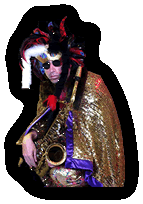
Bio Summary
Labeled “explosive” by the Boston Globe, two-time New England Music Award nominees Revolutionary Snake Ensemble’s most recent cd I Want That Sound!has received extensive critical acclaim, and entered the CMJ jazz radio top ten chart just two weeks after its release.
NYC Jazz Record writes that “Revolutionary Snake Ensemble has been putting its unique and somewhat twisted twist on the New Orleans brass band tradition for more than 25 years…hard-partying avant-funk, with boisterous soloing…I Want That Sound! is a strong example of how Ken Field and the Revolutionary Snake Ensemble continue to push the brass band tradition forward in an entirely original way, all the while making music that’s a heck of a lot of fun.”
KBCS Seattle Public Radio says that RSE “continues to mine the vein of New Orleans – with post-bop, and touches of Avant – this band cooks; edgy, raucous, fun, and first rate!”
And the Boston Herald adds that “People tend to think of second line bands – brass bands steeped in New Orleans traditions – as instant party starters. It’s a great compliment, maybe the best compliment ever, but it limits the sonic and emotional range of these bands. Revolutionary Snake Ensemble can absolutely get a party started. But on the local horn collective’s fourth album, I Want That Sound!, the players also explore the wild outerlands of jazz.
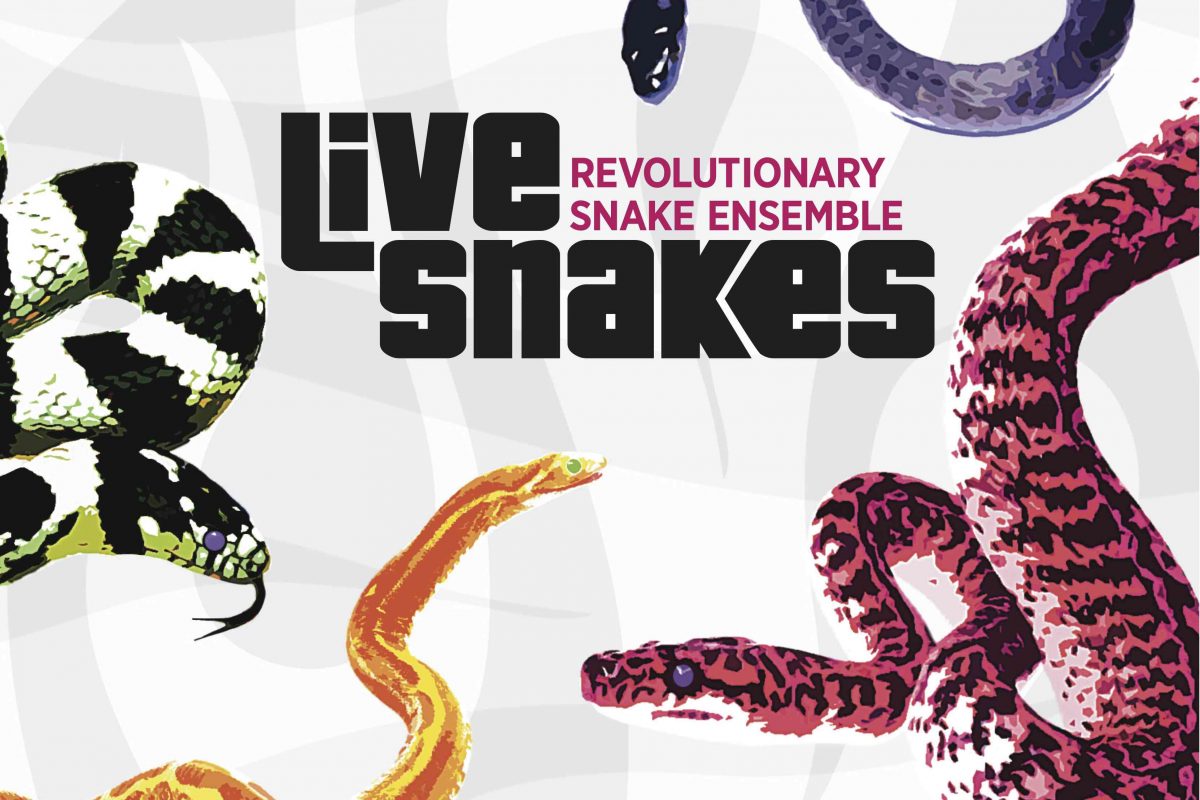
Their 3rd release, Live Snakes (Accurate 2014), was recorded in 2011 & 2013 in Boston, Brooklyn, and Manhattan, and documents four distinct incarnations of the ensemble, with two remixes by Field, and with guest musicians including Charles Neville, Josh Roseman, Kenny Wollesen, and Matt Darriau. With sold out CD release performances at Boston’s Regattabar, at Barbes in NYC, and at Kennedy Center in Washington, D.C., the CD broke into the top 10 on the CMJ jazz chart in its 2nd week out, and was an Editor’s Pick in Downbeat Magazine.
The group’s 2nd CD, Forked Tongue (2008), spent 2 months on the CMJ North American jazz top 20 chart, peaking at #11, and appeared on best-of-2008 lists in the Village Voice & in Estonia, plus in Georgia, Wisconsin, Kansas, Michigan, Massachusetts, Ohio, and NY. The disc features unique treatments of music by Field, Ornette Coleman, Billy Idol, and others.
Notable Revolutionary Snake Ensemble performances have included the Krewe of Muses Mardi Gras Parade (New Orleans); Kennedy Center for the Performing Arts; Festival of Redentore (Venice, Italy); UFO Festival (Roswell, NM); Tonic (NYC); the Museum of Fine Arts (Boston); the Brooklyn Academy of Music; the Puffin Cultural Forum; Tipitina’s (New Orleans); Berklee Performance Center; the Somerville Theater; First Nights Boston, Providence, Fall River; the Cambridge River Festival; ArtBeat; the Central Square World’s Fair; and other venues.
From 2005-2009 the Snake Ensemble traveled by train five times from Boston to New Orleans, playing on board the Amtrak Crescent, to march with the Krewe of Muses in their annual Mardi Gras parade. The Ensemble can be heard on Parade of Numbers, an animated counting piece regularly aired on the television program Sesame Street.
RSE’s debut release, Year of the Snake (2003), included music by Field, Sun Ra, John Scofield, James Brown, and others, and was listed as one of the top discs of the year on New York NPR affiliate WNYC, in the New Orleans Gambit Weekly, and on Radio Popolare in Milan, Italy.
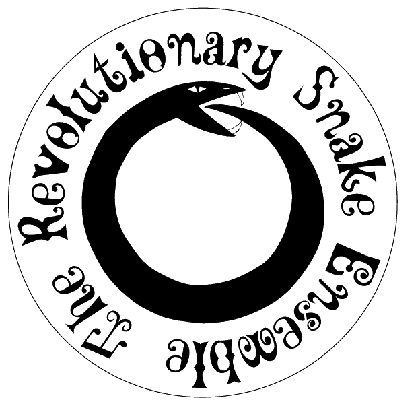
History: "Live Snakes" (Accurate Records, 2014)
Saxophonist/composer Ken Field‘s Revolutionary Snake Ensemble is on the march, spreading the gospel of groove far and near. Using the raucous rhythms of the New Orleans brass tradition as a launching pad, the Boston band has forged a volatile and unbridled sound that’s captured in all of its expressive glory on its third album, Live Snakes (Accurate Records).
Recorded in 2011 and 2013 in Boston, Brooklyn, and Manhattan, the album documents four distinct incarnations of the highly mutable ensemble, with two sonically inventive remixes by Field thrown in for good measure. Adding to the deep pool of Boston talent that has sustained the RSE for more than two decades, Live Snakes features an extended family of players, including New Orleans tenor saxophone great Charles Neville and New York masters Josh Roseman (trombone), Kenny Wollesen (drums and percussion), and Matt Darriau (tenor sax and flute).
Decked out in feathered and metallic finery that evokes Sun Ra’s Arkestra as much as the Mardi Gras Indians, the RSE has always honored the essential role of New Orleans brass bands in providing succor and uplift to mourners accompanying loved ones for burial (while also fulfilling the celebratory imperative for the promenade back from the cemetery). A good deal of Live Snakes’ emotional punch stems from the fact that Field’s wife, the renowned filmmaker and animator Karen Aqua who often collaborated with the RSE, lost her battle against cancer just two weeks after the album’s earliest session in 2011.
The whole New Orleans concept of a jazz funeral, where it’s very somber and moving at the beginning and then you break into celebratory uptempo grooves afterwards, really helped shape this album,” Field says. “After playing in churches and at Karen’s memorial it really brought home again that that’s the script for how music should be. You’re mourning and you’re celebrating. The music encompasses these really conflicting emotions, joy and sadness at the same time.
The heart of Live Snakes is the aching dirge “For Karen,” a stunning group improvisation from the 2011 session at Brooklyn’s 58 Northsix Media Labs in which Field’s bandmates join his raw but self-possessed cri de coeur. The lamentation segues seamlessly into a lugubrious rendition of the spiritual “I’ll Fly Away” recorded by a full eight-piece band two years later at Cambridge’s Regattabar, a performance that ends uptempo as a high-stepping celebration. The entire album’s sequencing follows this kind of emotional rather than temporal logic, imbuing Live Snakes with the feel of a cathartic and epiphany-filled odyssey.
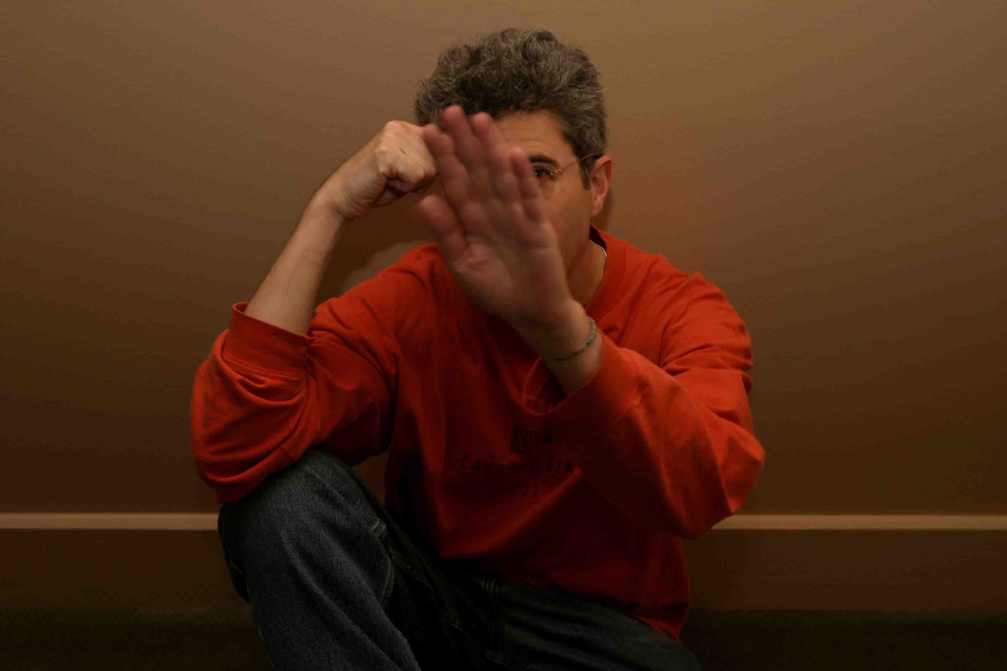
Opening with an ecstatic blast, Field welcomes listeners with “Parade,” an infectiously kinetic piece of lapidary Crescent City funk that makes it clear why the RSE has long been an honored presence at Mardi Gras. It’s a minimalist quintet version of the band powered by Wollesen and drummer Phil Neighbors’s brilliant rhythm section interplay, a polyrhythmic swirl that also inspires Field and Darriau’s tag-team horn work on “Slots” and the inventively grooving “I Got It.”
Marked by wicked irony, bawdy humor, seat-of-the-pants arrangements, and a love of unabashedly beautiful melodies, the band is equally effective interpreting hymns, like Thomas Hastings’s “Rock of Ages,” and jazz standards, such as Juan Tizol’s Ellingtonian classic “Caravan,” which gets a torrid treatment. In a performance that brings to mind Lester Bowie’s Brass Fantasy, the RSE digs into the 1950s pop hit “Que Sera Sera” with style and aplomb. Field closes the album with an atmospheric remix of “Cassandra 4,” a tune originally commissioned by Bridgeman/Packer Dance, and a newly constructed piece “Breakdown Part One” that can best be described as Miles Runs the Voodoo Down to Basin Street. In a typically Fieldian move, he turns a live album into an opportunity for further investigation into form and texture.
“I’m a firm believer in experimentation: I don’t like doing the same thing twice or repeating what other people have done,” Field says. “But at the same time I like the idea of maintaining some continuity with what listeners expect, so when we’re rhythmically complex sometimes we’ll be harmonically simpler. I play a melodic instrument, so we’re always going to be focusing on melodically based music.”
Field founded the Revolutionary Snake Ensemble in 1990 when he assembled an improvisational horn and percussion group with trumpeter and cartoonist Scott Getchell for a pagan women’s ritual celebration. The response was so positive that he decided to continue the project as a vehicle for the region’s skilled free improv set. But as Getchell moved on to other projects, Field gradually developed a book featuring his originals and rarely played tunes by John Scofield, Sun Ra, and Ornette Coleman set to funky New Orleans marching grooves.
Part workshop and part improvisers’ clinic, the band attracted a revolving cast of players. “The material was very improvisational and the arrangements tended to be spontaneous,” Field says. “I’d direct on the spot, which started as a very stressful role. Over time I learned a lot about how to do that, and it’s still the way the band works.”
Over the years, the RSE has featured a host of stellar musicians, including Dana Colley (Morphine), Jesse Williams (Al Kooper/Duke Robillard), Russ Gershon (Either/Orchestra), Eric Paull (DJ Logic, Clem Snide), Ken Winokur (Alloy Orchestra), Charlie Kohlhase (John Tchicai/Leroy Jenkins/Anthony Braxton), Jim Prescott (G Love & Special Sauce), Kimon Kirk (Aimee Mann, Session Americana), Scott Getchell (Lars Vegas, Skull Session), Dave Harris (Naftule’s Dream, Les Miserables Brass Band), and Bob Pilkington (Chandler Travis Philharmonic).
The band’s acclaimed debut album, 2003’s Year of the Snake (Innova Recordings), brought national attention. The following year the RSE began playing regularly at Mardi Gras, a sojourn made possible by a singular arrangement with Amtrak’s Crescent train in which the band performed their music en route to New Orleans. On arrival, the Snake Ensemble has regularly marched with the all-women Krewe of Muses, an experience that “legitimized the band to me,” Field says.
We would get down there, play a little party, and people assumed we were from New Orleans, and that meant a lot to us. At the same time, we were doing something different. It gave us the experience of meeting and playing with some New Orleans musicians, and they always encouraged us to keep doing our own thing.
With its second album, 2008’s Forked Tongue (Cuneiform), the RSE continued to expand its already far-flung repertoire, ranging from hymns and spirituals to traditional New Orleans parade anthems and tunes by everyone from Billy Idol to Ornette Coleman. With Live Snakes, the revolution continues to advance, revealing that this is one insurrection best experienced in the flesh.
Born in Red Bank, New Jersey, Field grew up next door to a club frequented by Bruce Springsteen in his early days with Earth (he didn’t find out about his hometown’s most famous native son, William “Count” Basie, until much later). Starting on clarinet at 10, Field made quick progress, playing in marching band and orchestra, and put in some extracurricular time on tenor sax in a high school rock band.
An accident his freshman year at Brown University knocked out one of his front teeth, which brought his clarinet playing to an immediate end. Turning his attention to the flute, Field started to teach himself to improvise while managing the Providence folk and blues venue Big Mother Coffee House. While studying applied mathematics, he fell in with some local musicians who introduced him to innovators like Coltrane, McCoy Tyner, Weather Report, and Frank Zappa.
“I started jamming with them on flute, and it was a whole educational thing for me, being exposed to all this music I really didn’t know,” Field says.
Working as a computer scientist, he turned his attention to the alto sax, and started commuting to Boston to study with noted teacher Joe Viola. Eventually he took time off from his day job to attend Berklee from 1977 to 1979, which led to his move to Boston. He spent several years playing with the psychedelic funk band Skin, and ended up replacing saxophonist Steve Adams (who was moving to the Bay Area to join Rova Saxophone Quartet) in Birdsongs of Mesozoic, a new music/chamber rock ensemble that spun off from the storied band Mission of Burma.
That was a transformative experience,” Field says. “Birdsongs is an avant rock band that’s compositionally based. I learned a lot from those guys, pushing all kinds of musical limits.
Field continues to perform and record with Birdsongs, while also maintaining a busy solo career as a player and composer with five solo releases, including Subterranea (O.O.Discs), Pictures of Motion (sFz), Tokyo in F (Sublingual), Under the Skin (Innova), and Sensorium: Music For Dance & Film (Innova). Field has written scores for animation, film, modern dance, and television, including music for Sesame Street.
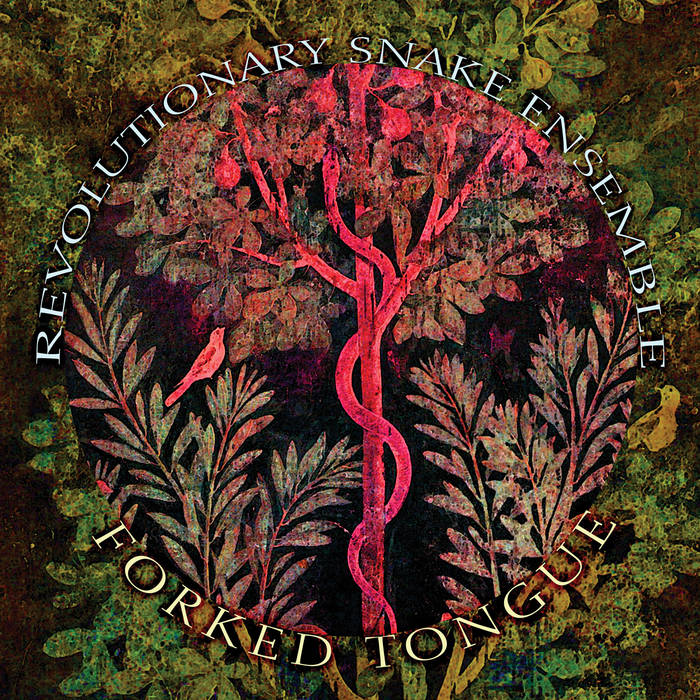
History: "Forked Tongue" (Cuneiform Records, 2008)
Dressed a la Mardi Gras in feathered masks and multi-colored, sequined costumes, playing music that riotously combines the rhythms of New Orleans brass bands with improvisation and heaping undercurrents of funk, the Revolutionary Snake Ensemble inhabits that rare musical planet on which Sun Ra, James Brown, George Clinton & Parliament Funkadelic, and a myriad of New Orleans marching bands jointly reside. Based physically in Boston since forming in 1990, the horn and percussion-based group is led by saxophonist/composer Ken Field, who describes it as “a funk and street beat brass band, playing New Orleans and other modern improvised celebratory styles.” The Snake’s music is rooted in the New Orleans tradition of jazz funerals – a tradition unique to the birthplace of jazz – which began with a ‘first line’ procession to the burial ground, a brass band playing hymns in a funeral dirge. Afterwards, in an upbeat celebration of the deceased’s life, the musicians play up-tempo “second line” music for the now-partying mourners. Playing Field’s original compositions and rearrangements of traditional tunes, opening up new avenues for improvisation, the Revolutionary Snake Ensemble celebrates, expands, and transforms the brass band tradition – a tradition, in the wake of Hurricane Katrina, that is now in diaspora.
A saxophonist/ composer/ improviser, Ken Field is one of Boston’s most dedicated and versatile musicians. Since 1988, he has been a member of Birdsongs of the Mesozoic, a New Music/ chamber rock ensemble that began as a spinoff from the legendary Mission of Burma. Birdsongs has recorded seven internationally acclaimed CDs on Cuneiform Records, including the recent Extreme Spirituals, which features the bass/baritone of acclaimed African American vocalist Oral Moses. Field also has an active solo career. An improviser and composer of classical/New Music, he has performed internationally and released four solo discs [Subterranea (O.O.Discs), Pictures of Motion (sFz), Tokyo in F (Sublingual), and Under the Skin (Innova)]. Field has composed music for animation & film, for Bridgman/Packer Dance, and for television, including music for Sesame Street. As a performer, he has worked as a sideman with countless renowned reggae, funk, R&B, rock, jazz, and world beat artists – and performed for former President Bill Clinton. Field is also the long-standing host of The New Edge, a Boston-based weekly radio show featuring a broad range of creative instrumental music.
The Revolutionary Snake Ensemble was formed in 1990 when Field assembled an improvisational horn and percussion group with trumpeter and cartoonist Scott Getchell to entertain at a pagan women’s ritual celebration. Field decided to continue the project, conceiving it initially as an improvisational group rooted in Boston’s free jazz/ improv scene. But the group “soon started playing some of my original pieces, plus obscure music by John Scofield, Sun Ra, Ornette Coleman, and others, mostly with a New Orleans funky marching groove,” recalls Field. As New Orleans brass band and Mardi Gras music began playing ever-increasing roles in the band’s repertoire, the Revolutionary Snake Ensemble came into its own. Speaking of the Snake’s music as though it were a bowl of New Orleans gumbo, which begins with a classic roux, critic Dan Oullette noted that it “captures the abandon of a street parade while expanding its stylistic scope…it’s got the essential ingredients spiced with fresh flavors”. Performer Magazine noted that the band “may operate from the traditions of New Orleans music, but the boundaries are pushed wide open when they actually play. “We mostly play from ‘head’ charts, where everyone has the melody and chord changes in front of them. Since there’s no guitar or keyboard, the horns can not only solo, they “even alter the harmonies spontaneously,” Field said. “So there’s a lot of improvisation. I also conduct some of the arrangements live” For both the band and its audiences, notes Performer, “doing all of the high art ministrations of improvisation and having an audible party at the same time really is the best of both worlds.”
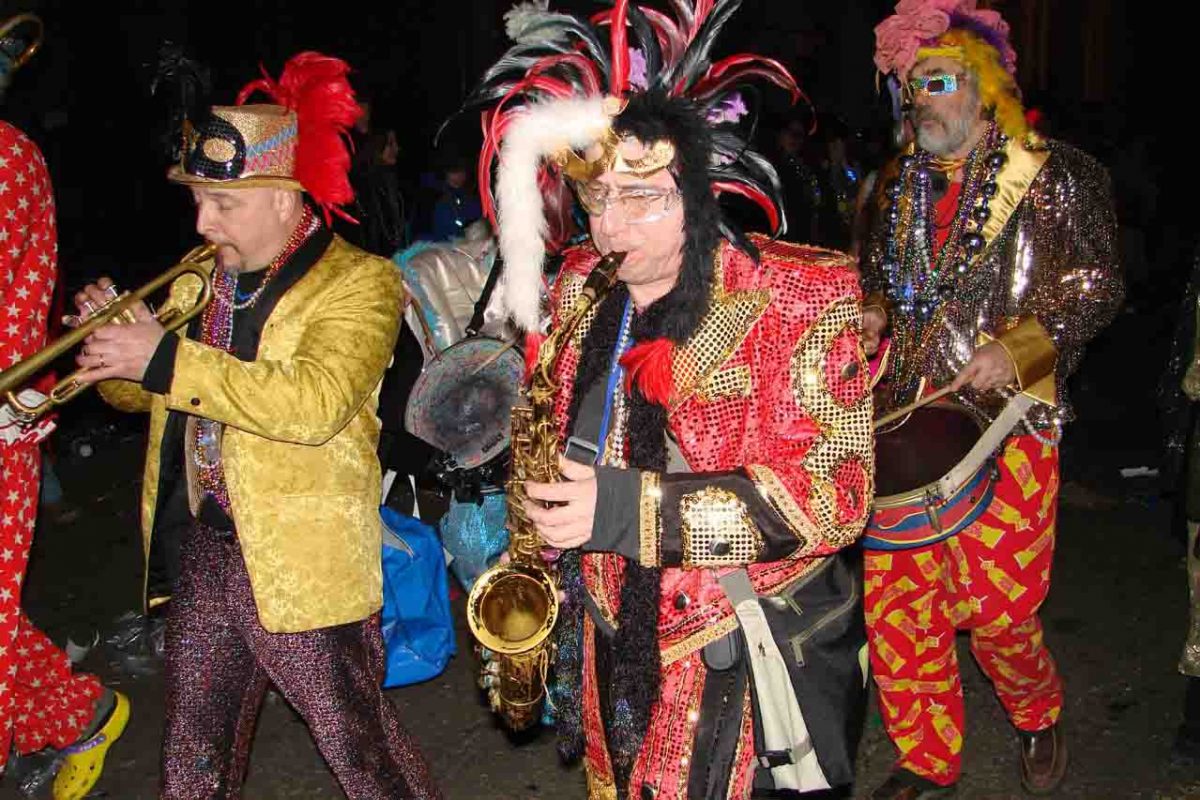
Combining their “booty-shaking and brain stimulating music” [Splendid] with over-the-top/outrageous costumes – feathered masks and sequined robes from a wardrobe shared by Mardi Gras and Sun Ra – the Revolutionary Snake Ensemble’s performances soon became one of Boston’s most-beloved ‘events’. They played everywhere in town – from private parties (they re-arranged a Billy Idol tune for a White family wedding) and clubs, to such revered institutions as Harvard, Tufts, and the Museum of Fine Arts. While usually averaging 7-8 members – two drummers, one or two bassists, and four horns – the ensemble’s lineup and size shifts over time and for specific events. Over the years, the Revolutionary Snake Ensemble “tribe” came from all corners of Boston’s music scene. Notable musicians who have performed as part of RSE through the years include Dana Colley (Morphine), Jesse Williams (Al Kooper, Duke Robillard), Russ Gershon (Either/Orchestra), Eric Paull (DJ Logic, Clem Snide), Ken Winokur (Alloy Orchestra), Charlie Kohlhase (John Tchicai, Leroy Jenkins, Anthony Braxton), Jim Prescott (G Love & Special Sauce), Kimon Kirk (Aimee Mann, Session Americana), Scott Getchell (Lars Vegas, Skull Session), Dave Harris (Naftule’s Dream, Les Miserables Brass Band), and Bob Pilkington (Chandler Travis Philharmonic). Repeatedly nominated in their Best Music Poll by the Boston Phoenix and WFNX Radio, the Revolutionary Snake Ensemble has been twice nominated by a panel of music writers and critics for a Boston Music Award.
In 2003, the Revolutionary Snake Ensemble released their first CD, Year of the Snake, on Innova Recordings. Recorded in 2002, it included music by Field as well as Sun Ra, John Scofield, James Brown, and others, with liner notes written by two-time Grammy-winning New Orleans music producer Scott Billington. It also included a track, “Parade”, originally recorded for an animated counting piece on Sesame Street, a widely-broadcast children’s television program. Year of the Snake brought the Revolutionary Snake Ensemble’s music to an international audience. Receiving considerable public, radio, and press acclaim, the studio recording was included on best-of-year lists from New York City’s NPR affiliate WNYC, the Gambit Weekly in New Orleans, and Radio Popolare in Milan, Italy. The first pressing sold out in two months. Revolutionary Snake Ensemble began taking their show on the road, accepting out of town gigs at NYC’s Tonic, the Brooklyn Academy of Music, the Puffin Cultural Forum, and the John F. Kennedy Center for the Performing Arts in Washington, DC. They also began taking their show on the rail. Beginning in 2004, in a unique arrangement with Amtrak, America’s national rail line, the Snakes began an annual pilgrimage to Mardis Gras on Amtrak’s Crescent train, performing their music en route. On arrival, the Snake Ensemble has marched yearly with the all-women Krewe of Muses in their New Orleans Mardi Gras parade. After Hurricane Katrina hit New Orleans on August 29, 2005, devastating the city where countless jazz artists made their homes, the Snakes’ pilgrimage assumed a more poignant note.
The Revolutionary Snake Ensemble’s 2nd release, Forked Tongue, is their first release on Cuneiform. In the New Orleans brass band tradition, Forked Tongue opens with a traditional New Orleans funeral dirge, “Just a Closer Walk”, before exploring more upbeat fare. Containing a total of 12 tunes, the disc showcases a wide range of the Snakes’ repertoire. It includes unique arrangements of traditional New Orleans marching music and spirituals and of music by such diverse songwriters as William Broad (aka Billy Idol), Ornette Colemen (this may be the first disc ever to feature music by both Idol and Coleman!), Norman Span, and Jay Livingston & Ray Evans, as well as original material by Field. The album features Field on alto sax, whistles and percussion; Andrew Hickman on tenor saxophone, Jon Fraser on trumpet, Lennie Peterson on trombone, Kimon Kirk on acoustic bass, and both Eric Paull and Phil Neighbors (who also contributes electric bass) on drums and percussion. Guest vocalist Gabrielle Agachicko performs Field’s stunning minor key arrangement of the traditional classic “Down By the Riverside.” Other guests include Karen Aqua (djembe, tambourine), Andy Pinkham (electric bass), and Jesse Williams (bass). Recorded in 2006 at Boston’s Mortal Music Studios by engineer/owner Andy Pinkham, it was remixed by Minneapolis’ Balanced Productions and mastered in Los Angeles by Bob Demaa.
Don't Miss the Revolution!
Get notifications about new releases and live shows announcements by joining our...
